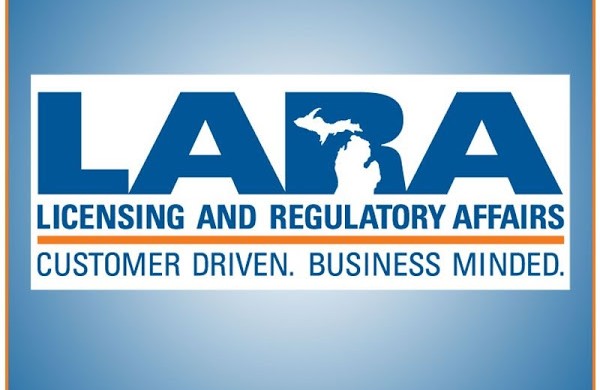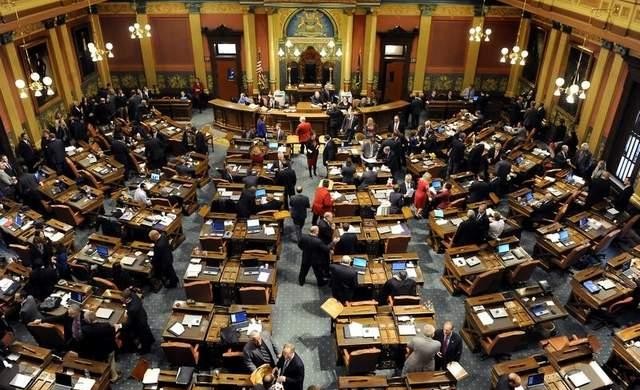
Jul 28, 2015 | Blog, Michigan Medical Marijuana Act, Michigan Medical Marijuana Association, Michigan Medical Marijuana Criminal Defense Attorney Michael Komorn, News
Medical Cannabis Crackdown in Michigan?
7/20/15 – Michigan law enforcement has thrown down the legal gauntlet against at least three medical cannabis dispensaries this month, including two in the Detroit metro area and one in a small town several hours northwest of the city.
In Detroit proper, the dispensary Detroit Medz was raided on July 14, with police seizing a gun and “drugs” and making an arrest, according to Mlive.com.
In Canton, a suburb west of Detroit, three residents who operate a dispensary that was raided in March were charged with felony crimes last week, including conspiracy to deliver marijuana.
In Shelby Township, far to the northwest of Detroit, local and federal law enforcement agents raided the dispensary Advance Medical Supply on July 10. Police conducted at least four searches and seized three vehicles and at least 10 pounds of cannabis.
The raids and criminal charges come just a few months after eight other dispensaries were raided in northern Michigan. They could be a response by the law enforcement community to a resurgence in the state’s MMJ industry.
Some of the raids may have been sparked by dispensaries not verifying the Michigan residency of customers, Mlive.com reported. But given the gray legal area that dispensaries operate in, how law enforcement deals with such businesses is often left to local discretion.
State police raided eight medical cannabis dispensaries in northern Michigan this week, serving 16 search warrants and seizing an untold number of cannabis plants.
Not a single arrest was made, however, even though law enforcement officials said the eight dispensaries are “suspected of selling marijuana illegally.” Police also seized processed marijuana products and “other evidence” from the homes and businesses that were searched.
The dispensaries were all in Otsego County, some in the town of Gaylord, which is more than three hours north of Detroit. Whether or not any criminal charges will be filed will be up to the county prosecutor.
The medical cannabis industry in Michigan has long been in limbo. The state’s Supreme Court ruled two years ago that dispensaries are illegal, but as many as 250 dispensaries still exist in a quasi-legal status, with some getting protection from local communities that approve of MMJ.
It remains to be seen if the eight dispensaries that were raided will reopen. In some other states that have experienced similar raids, targeted dispensaries actually were able to open their doors again.

Jul 22, 2015 | Blog, Medical Marijuana Attorney Michael Komorn, Michigan Medical Marijuana Act, Michigan Medical Marijuana Association, News
Activists are screaming mad at the conduct of officials representing Governor Rick Snyder’s administration during a hearing today to determine if autism should be added to the list of illness that qualify a patient to use medical marijuana in Michigan. The petition, submitted in 2014, contains a summary of 75 peer-reviewed articles on autism and 800 pages of reference material. ”When the panel sat down today, what they had was pieces of the document,” said Southfield attorney Michael Komorn. Pieces apparently selected by the Attorney General’s office, according to statements made on the record by Board officials. What was missing? “The Summary, with the 75 peer-reviewed studies, and the 800 pages of clinical research on autism and cannabis,” Komorn said. Advocates sued the government in Ingham County Circuit Court to force the Department of Licensing and Regulatory Affairs (LARA) to consider a petition for that purpose submitted in 2014 by Lisa Smith, whose son Noah has autism and other illnesses. Petitions are debated by the Medial Marihuana Review Panel (the Board) under rules established in 2008 by the Michigan Medical Marihuana Act (MMMA). A previous petition to add autism to the MMMA was rejected at a Board hearing back in 2013. “We litigated for a year,” to get the Smith petition accepted, Komorn said. The State was represented by the Office of the Attorney General, Bill Schuette. The language of the MMMA requires that each petition properly submitted must be considered by the Board. Schuette’s and LARA’s response was the opposite: we already ruled on that illness and no subsequent petition will be considered. “The Court decided theirs was a wrong interpretation. We won; they had to give us a new hearing on the petition submitted.” A hearing on the Smith petition was held in May of this year. On July 1 a whole new Board was created, per rule changes made in January 2015 by LARA over the objections of citizens and Senators. Some of the members of the new panel had not heard the testimony on the Smith petition taken by the Board weeks earlier. “When the Board assembled today we were expecting a vote yea or nay on the petition,” Komorn related. “Before we were able to begin the conversation it was brought to the attention of the Board as a whole by (Board member) David Brogren that this very comprehensive document with supporting papers was not given in its entirety to the Board, and that the Board should consider the entire package before voting.” The science was scrubbed from the document given to the Board for consideration, Komorn said. “When the Circuit Court made an order that the petition be considered, they meant the whole petition,” Komorn growled. ”(The Court) didn’t change the material submitted, it required the Board to consider the petition filed with the Court.” Of a greater concern is the reason cited for the edited version of the petition being presented. Along with a new Board comes a new leader, and the newly-appointed Board made selecting a new Chair their first priority. When the confusion regarding the petitions was exposed, her reaction was not one that inspired confidence among the hearing’s attendees. “The statement she made on the record was very distressing, that this information was given to the board by the Attorney General, not the Court,” Komorn said. “The Attorney General’s role was referenced by (the Chair), who said, in response to Brogren, this is what was sent to us by the Court via the Attorney General.” “The representative kept referring to the fact that this document is what the Attorney General’s office gave us,” said Jamie Lowell of Ypsilanti’s 3rd Coast Medical Marijuana Dispensary, who attended the hearing. Brogren mentioned on the record that he had given the Board the petition in its entirety two weeks ago. Even after the issue was exposed, Komorn said the Chair seemed more concerned with spin control than she was with establishing proper process. Komorn explained that “she kept insisting that the Board had all the information they needed to make a decision on autism and medical marijuana,” he said, “without seeing any of the science behind it.” Brogren’s objections to considering the issue without all the facts swayed the result and stayed the Board from voting. They will reconvene at a later date to make a final determination on the Smith petition, after receiving the entire document. In addition to being a criminal defense attorney, Komorn is the host of an Internet-base radio program broadcasting weekly for more than four years. The Planet Green Trees Radio Show (PGT) has followed the progress of the autism petition from the start, prior to 2012’s initial rejection. Shows #255 and #257 covered the topic with interviews and behind-the-scenes looks at the tribulations experienced by those advocates who sought a positive result at the July 20 hearing. One of those interviewed by the PGT staff: Dr. Harry Chugani, chief of pediatric neurology at Children’s Hospital of Michigan in Detroit “There was a major flaw in the process of how information was being given to the Board members,” Komorn stated. He challenged the notion that the Attorney General, a noted medical marijuana detractor and a major opponent of the MMMA in 2008, should be filtering information approved by the Court for use by a state agency. “Mind you, the AG had to be sued to bring this information to the Board in the first place,” Komorn emphasized. “Why is it OK for the Director of this Board to rely on them for the information used to make the determination of autism’s validity for inclusion on the medical marijuana program?” As a barometer of governmental efficiency, Komorn gave the Board’s actions today two thumbs down. “This Board is not operating in a way that anyone in the public would appreciate… this behavior should do nothing but bring concern from citizens… I don’t think that anyone that walked out of that room has one bit of confidence in the integrity of the process.” “I’d like to believe in the possibility of a fair hearing, but after experiencing the Attorney General in action over the years I can’t help but believe today’s behavior, creating unnecessary confusion and restriction, is intentionally designed to lead to a negative outcome,” Lowell observed. “I really hope I am wrong.”
Source: The Compassion Chronicles by Rick Thompson at 6:15 AM on July 21, 2015

Jun 3, 2015 | Blog, Michigan Medical Marijuana Act, News
2013 MMMP STATISTICS FINAL REPORT
The Bureau of Health Statistics report regarding the Michigan Medical Marihuana Act Program
Other updates
ENROLLED HOUSE BILL No. 4851
Act No. 512 Public Acts of 2012
Approved by the Governor December 27, 2012
Filed with the Secretary of State December 28, 2012
EFFECTIVE DATE: April 1, 2013
ENROLLED HOUSE BILL No. 4834
Act No. 514 Public Acts of 2012
Approved by the Governor December 27, 2012
Filed with the Secretary of State December 28, 2012
EFFECTIVE DATE: April 1, 2013
PLEASE VISIT THESE SITES FOR THE MOST CURRENT INFORMATION
Link to Current Registry Information
Link to MMMA Act and Updates via LARA (State of Michigan)

Nov 26, 2014 | Michigan Medical Marijuana Act, Michigan Medical Marijuana Association
http://www.youtube.com/watch?v=QfWNhkZPzs4
Subscribe to Komorn Law on YouTube
If you or someone you know is facing charges as a result of Medical Marijuana prescribed to you as a Medical Marijuana patient under the Michigan Medical Marijuana Act, contact Komorn Law and ensure your rights are protected.
Michael Komorn is recognized as a leading expert on the Michigan Medical Marihuana Act. He is the President of theMichigan Medical Marijuana Association (MMMA), a nonprofit patient advocacy group with over 26,000 members, which advocates for medical marijuana patients, and caregiver rights. Michael is also the host of Planet Green Trees Radio, a marijuana reform based show, which is broadcast every Thursday night 8-10 pm EST. Follow Komorn on Twitter.

Nov 26, 2014 | Michigan Medical Marijuana Act
LANSING, MI — Lawmakers early Friday approved changes to Michigan’s medical marijuana law.
The legislation adds clarification and restrictions to the voter-approved medical marijuana act of 2008 and got the required support from three-fourths of legislators. The changes are the result of many months of meetings with stakeholders and committee hearings with testimony from law enforcement officials, doctors, medical marijuana caregivers and patient advocates.
Starting around 4 a.m., two main bills got 29-9 and 30-8 votes in the Republican-led Senate. Shortly after, the GOP-controlled House voted 98-7 and 100-5 to send them to Gov. Rick Snyder.
Michael Komorn, an attorney and president of Michigan Medical Marijuana Association, told MLive last week that the bills are unnecessary, and that many issues with the law are already being handled in court.
HB 4834 requires a driver’s license or state ID card to obtain medical marijuana patient registration cards, extends the card’s expiration from one to two years, and attempts to address a backlog of card applications by calling for the state to contract with a private company to help process and issue registration cards.
It also would allow the Department of Licensing and Regulatory Affairs to verify the validity of registry cards to members of law enforcement, without disclosing more information than necessary.
HB 4851 adds conditions for a “bona fide physician-patient relationship,” which is required for medical marijuana cardholders.
It also clarifies how marijuana plants must be enclosed, and forbids anyone from becoming a caregiver (or provider of medical marijuana) if they’ve been convicted of a felony in the past 10 years or have ever been convicted of a felony involving illegal drugs or an assaultive crime.
That means some people who currently provide patients with medical marijuana will be excluded from doing so.
“There are people who may fall into that category who are taking care of a mother who has cancer or other patients who are sick,” Komorn said. “What are they going to do now?”
HB 4853 lays out sentencing guidelines and HB 4856 regulates the transportation of medical marijuana in cars.
Another bill headed to the governor specifies that medical marijuana expenses do not have to be covered by worker’s compensation or auto insurance benefits.
from mlive. Read the original article here

Nov 26, 2014 | Michigan Medical Marijuana Act
House Bill 4856 was passed by the Michigan Legislature during a frantic lame-duck session in which dozens of bills were voted on and passed within a matter of a few hours, including votes taken at 4:30am. The text of HB 4856 is below:
Sec. 474. (1) A person shall not transport or possess usable marihuana as defined in section 26423 of the public health code, 1978 PA 368, MCL 333.26423, in or upon a motor vehicle or any self-propelled vehicle designed for land travel unless the usable marihuana is 1 or more of the following:
(a) Enclosed in a case that is carried in the trunk of the vehicle.
(b) Enclosed in a case that is not readily accessible from the interior of the vehicle, if the vehicle in which the person is traveling does not have a trunk.
(2) A person who violates this section is guilty of a misdemeanor punishable by imprisonment for not more than 93 days or a fine of not more than $500.00, or both.
This act is ordered to take immediate effect.
Attorney Michael Komorn blogs on occasion for The Compassion Chronicles. Here are his thoughts:
Michael Komorn, attorney
Michael Komorn at the 2012 Medical Marijuana Election Discussion
House Bill 4856, born out of the late night lame duck session, is not a law intended to protect patients or caregivers. Instead it sets out a new opportunity for law enforcement officers to find violations of how patients and caregivers engage in the medical use of cannabis. Furthermore it is a law that exclusively targets persons who choose to treat their serious or debilitating condition with medical cannabis, and no one else.
If the goal of this legislature was to clear up the “holes” in the law, the passing of 4856 would earn the Legislature an (F) Failure on their report card, for doing the exact opposite:
1.The MMMA requires a 75 percent vote in both houses to amend the act, but the creation of 4856 only required a 50 percent vote to amend the Michigan Penal Code, and created a prohibition for previously protected behavior.
2.4856 prohibits “persons” from carrying usable marihuana in the interior of a vehicle, unless it is within an enclosed case (definition of enclosed case not provided). Yet the MMMA specifically protects the same behavior 4856 prohibits. Section 4(a) and (b) of the act, protects a person from arrest, prosecution or any penalty, if they possesses, a registry I.D. card and 2.5 ounces or less of usable marihuana, so long as not while on a school bus, grounds of a preschool, primary or secondary school, correctional facility etc.. Said another way 4856 creates, conflict and confusion upon implementation and will certainly be challenged with litigation.
3.4856 may lead officers to search patients and caregivers vehicles upon learning of their registry status to determine if their medicine is enclosed properly in a case. In this light, 4856 is hard to reconcile with the most basic protection outlined in the act prohibiting the use of a patients status, their card, or certification documents as probable cause to search as outlined in Section 6. “6. Administering the Department’s Rules. (g) Possession of, or application for, a registry identification card shall not constitute probable cause or reasonable suspicion, nor shall it be used to support the search of the person or property of the person possessing or applying for the registry identification card, or otherwise subject the person or property of the person to inspection by any local, county or state governmental agency”
4.4856 refers to the MMMA’s definition section but never use the word patient or caregiver. 4856 prohibits a “persons” from carrying usable marihuana in the interior of their vehicle unless it is in a case, arguable implying a way for any “person” to now carry marihuana in a lawful way. One could even read 4856 to suggest any person now can carry unusable marihuana in a vehicle, and so long as it is not usable, and that this activity is no longer a crime.
5.4856 clearly creates another crime or reason for a patient or caregiver to get arrested, but at the same time provided so much confusion and conflict with the existing law that a reasonable argument could be made that 4856 suggest that cannabis is no longer illegal for persons, so long as you comply with 4856 and have your usable cannabis in your trunk.
The goal of this legislature should have been to ensure the implementation of the voter’s initiative. They should have started with the premise what can they do to protect patients and caregivers from arrest, and treat these issues as public health concern and not public safety issues. Their failure to follow this approach is the reason why laws like 4856 were passed. 4856 is not a reasonable restriction and the legislatures attempt to “fix” the act, can only be described as a big swing and a miss.
http://www.thecompassionchronicles.com/2012/12/29/komorn-a-swing-and-a-miss/
You can participate in a forum-style discussion on this issue. Click on the link below:
http://michiganmedicalmarijuana.org/index.php?showtopic=42094
Attorney Michael Komorn’ practice specializes in Medical Marihuana representation. He is the President of the Michigan Medical Marijuana Association (MMMA), a nonprofit patient advocacy group with over 26,000 members, which advocates for medical marihuana patients, and caregiver rights. Michael is also the host of Planet Green Trees Radio, a marijuana reform based show, which is broadcast every Thursday night 8-10 pm EST





